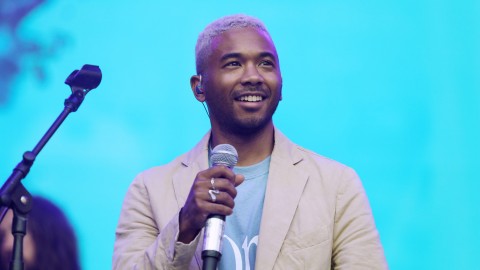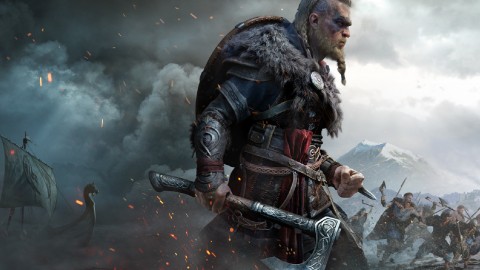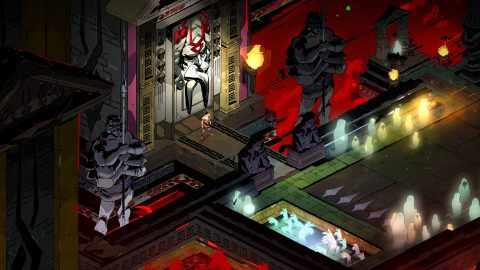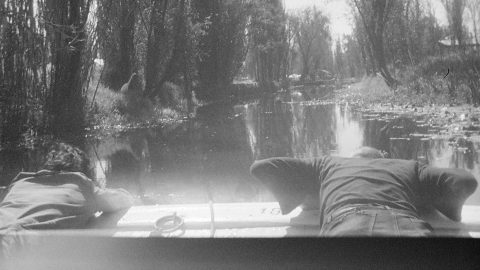
Fontaines D.C. frontman Grian Chatten looks out across north Dublin, towards the tranquility of the Irish sea. “As long as you have a view to a horizon,” he mutters, “there’s the potential to feel free, even for a minute.” At first it seems as though there’s a stained glass window behind his Zoom frame, though this turns out, rather more prosaically, to be a mere pattern on cotton, a drape darkening the window.
“I really want to get a green screen for these interviews, have a lovely meadow in the background,” he jokes. Chatten has been spending his coronavirus-induced lockdown in the refuge of books: lately he’s been sucked into the pages of Mikhail Bulgakov’s 1966 novel The Master And Margarita, stalking the backstreets of 1930s Moscow on the arm of Beelzebub and his coterie of vampires, witches and huge talking cats.
“I’ll never sing about the lockdown,” he insists. “It’s a fairly beige topic for me. I’m not sure how I’d turn that into something colourful. There’s unlimited places you can go inside your head without actually writing about the coronavirus or the fact you’ve got loads of toilet paper. That’s probably why I’m reading, because I’m trying to escape.”

The past 12 months have been a ragged reel of a year for Dublin’s post-punk scene champions Fontaines D.C. The band built a reputation for confrontational poetic intensity with a string of singles that hit like noir-rock tornado strikes (particularly ‘Too Real’, ‘Big’ and ‘Boys In The Better Land’) and performances so visceral and engrossed that Chatten would walk off if he wasn’t utterly submerged in the music. Their debut album ‘Dogrel’, released last April, kicked off a bawl-rock breakout only matched, in recent ‘post-guitar’ years, by IDLES making mincemeat of punk machismo.
‘Dogrel’ was drenched in acclaim: nominated for the Mercury Prize, it also bagged several Album Of The Year spots and barged into the Top 10 like a ranting street poet raiding the Booker Prize bar. As the rock world declared them the erudite new champions of the rock resurrection and the industry descended on the thriving Dublin scene to witness the likes of The Murder Capital, Fontaines powered triumphantly across Europe and America, crashing headlong into 2020 with a second album already in the bag, high on the momentum and hellbent on touring until they damn well ran out of road.
“If we did loads of fucking Zoom performances in bathrooms we’d probably fade out”
Then coronavirus hit like a stinger to the tyres and D.C.’s dark dragster screeched to a halt. A band whose first album bristled with desperation to escape the murky streets of Dublin, with all of its low-lives, gentrification and foiled ambition, are trapped back there after glimpsing the promise and possibilities of the great wide open. It might have been their worst nightmare, but instead they’re finding lockdown a helpful chance to pause for breath, refocus on the creativity that got them this far and reflect on their rocket-ship rise.
“It wasn’t even the rise of the band that was head-spinning,” Chatten says. “It was the pace and the relentlessness of it. I really did feel like we were put into a chamber that spins around and you come out the other side. I don’t really know what’s gone on for the last year, I’ve been so focused on what we’ve been doing.”

How will lockdown affect the band’s momentum, though?
“It might add to more longevity,” Chatten argues, “because we won’t be burning out. I’m focusing on writing and feeling free. I’ve never really thought about the trajectory of the band… I find it has a negative impact on your ability to create when you’re considering where it’s going and who it’s for. If we were going to be one of those bands that did loads of fucking Zoom performances in bathrooms and that we’d probably fade out overnight.”
What have you made of the ones you’ve seen so far?
“Some of them are nice; I liked the Kate Tempest one,” he replies. “The danger of it is it’s kinda seeing behind the curtain; it can take apart the world that an artist has created for you when you see them in a zone like that. Imagine seeing someone like Lee Hazelwood performing some of his tunes in his gaff – 16 Lees on a load of different streams with bags of McCoy crisps in the background. It’d ruin him more than a scandal. I’d be heartbroken.”

Certain influences naturally spring to mind when considering Fontaines D.C.: Joy Division, The Fall, Wire, PiL and the purposefully angular arthouse noise-mongers of post-punk. Lyrically, Chatten’s opaque, impressionistic and repetitious visions of down-at-heel Dublin life somehow manage to close the gaping chasm between early Arctic Monkeys and James Joyce. There’s another band you might reach pretty close to the bottom of the list of acts you’d credit when listening to Fontaines’ dank, dense second album ‘A Hero’s Death’: The Beach Boys. Not, you must admit, a group renowned for their grinding, volcanic sturm und clang of guitars and vocals that are like being pinned to the wall by a babbling psychopath who thinks he’s Brendan Behan. “Ba-ba-ba-ba-Barbara Ann” and Bermuda shorts this decidedly is not.
Yet it’s the Beach Boys – you heard – that the band cite as a primary influence on the new album. Help me Rhond… eh?
“It’s inspired by the stillness of the sea,” Grian explains. “Kinda like later Beach Boys. I’m not saying we’re anywhere near the Beach Boys in terms of harmonising or singing or anything like that, but we’d sing a capella a lot in the back of the van, practice harmonies and figure out how to arrange them properly. We tried to put the Beach Boys cloak over absolutely everything we did in America, as you do when you’re starved of context.
“I’m still a believer in people”
“I really lived inside that song ‘Your Summer Dream’, a simple early Beach Boys tune [from 1963]. It’s beautiful; it sounds like a daydream captured in sonic form. We daydreamed a lot; we were trying to escape what was around us and were listening to much more immersive music, music that had lefts and rights and corners and different streets. We wanted to make something a bit more subversive.
“[The Beach Boys created] a dream-like, lying-back-on-a-lilo daydreaming sort of feeling we wanted to capture. The thing about Brian Wilson and other people like Lee Hazelwood that really appealed to us when we were in the mood for escapist art was that they had a thoroughly built-up fantasy world that they’d quite fully realised in a sonic format. We talked a lot about the fantasy of our world and how we wanted to bring that to life.”

An initial version of the album was recorded in Los Angeles but scrapped and re-recorded with ‘Dogrel’ producer Dan Carey in Streatham at the start of 2020. Now just a ghost memory of the place remains on the record; it’s there in lines such as “You shoulda heard ’em in the Bowery” (from the churning, early R.E.M.-like opener ‘I Don’t Belong’) and the track ‘Living In America’, which sounds like The National’s ‘Bloodbuzz Ohio’ – if it were trapped, Pulp Fiction-style, in a basement in Buttfuck, USA. That song makes their stateside experience sound like a hellish prowl through a world of spray tans and “snowman coal”. Was it all cocaine and superficiality out there?
“There was an awful lot of that, yeah,” Grian nods. “A few of us were fairly heavy on the gargle, on the booze for a while. We drank almost exclusively whiskey for the whole tour. A pint or so of it before each gig, just to see you through and a bit more then after to help you sleep in the van. We weren’t really eating and we were burning the candle at both ends. It became a bit surreal as towns melted into each other and faces started to look a bit strange. It was a surreal environment we created for ourselves.”
“We tried to put the Beach Boys cloak over absolutely everything we did in America”
Fontaines’ US tour sounds like the classic boys-in-a-bigger-land first album wild ride. Grian recalls how, most mornings, they’d have to hunt down an absent member because “some acid heads dressed like cowboys would take someone away from a party at five in the morning, and we’d have to find them the next day before our drive to Detroit.”
Then there was the night in LA when a power cut scuppered their scheduled gig but, after they’d hit a nearby dive bar with some force, their agent called at midnight with a replacement club show at Gold Diggers. “We put it out that the gig was moved there and hopped in the van. When we got there it was already heaving. We were merry enough when we hit that stage.”

Grian recalls one night in San Francisco when, onstage, he was struck by the sense of claustrophobia that inspired ‘Dogrel’’s seething missives in the first place.
“By the time we hit the West Coast, I was forcing myself to think of things that had affected me in my life before and during each show,” he says. “I was doing it out of fear that I would someday grow detached from the songs. I came offstage in San Francisco feeling a bit traumatised because of the things I’d made myself think of and feel in order to conjure up feelings that needed to be exorcised in a performance.”
“I write to let myself know that I’m still alive”
This led him to stumble upon some repressed memories during their rendition of the tightly wound ‘Too Real’: “I came off and felt the effects of the things I’d made myself think of and visualise, and it took me a while to get over them. It made it difficult to socialise for a while afterwards. It’s so important for me to feel everything we’re doing when we’re onstage. I’d rather have thoughts that make me suffer, or think about things I wouldn’t like to think about in order to give a good performance.” But, he concedes, “it’s probably unhealthy as well.”
Chatten is at pains to point out that ‘A Hero’s Death’ isn’t about “travelling through America on the back of our first album and getting loaded and having a great time.” No, it’s about control. And to unpick it, we’ll have to delve a whole lot deeper.

Earlier in life, Grian fell for the poetry of the pitch: as a child he’d beg his dad to buy him packs of football stickers for his collection, but his father had a canny condition.
He remembers: “My dad would say he’d only buy me one of those packs of stickers if I learnt off a poem.” And poetry burrowed. “I felt like I was taking my education into my own hands to an extent and understanding and connecting with poetry on my terms. I suddenly realised that I was developing strong feelings about interpretations of poetry and found myself with the energy to argue about what things mean and where they come from. It all developed from there. It was just a sense that it was mine and not part of a system that was elitist by its virtue.”

Did you start using poetry to express your own troubled past?
A pensive moment. “Yeah. I think I’m quite empathetic and I understand how writing about other people can be subconsciously expressing things that I might myself be going through. I often relate to people that are going through a much more exacerbated version of what I’m going through. In writing about them, I achieve a sense of understanding of my own issues.”
Such as? “Loneliness – I’ve struggled to an extent with depression, as a lot of people have. Loneliness and a sense of meaninglessness about life. Every day I feel like I’m faced with a crossroads as to whether I should see what I could get out of life if I really engage fully. I’m basically not sure about the meaningfulness of life.”

Have you found any answers over the past year, as the band took off?
“Yeah. I’ve found endless meaning in a calm, self-forgiving approach to creativity,” he says. “Fortunately I haven’t had too many days where that’s been inaccessible to me. I don’t know what I’d do if it was lost. That’s a big part of the reason we’re all very protective in the band over where our creativity is coming from. If we listen too much to criticism or compliments – even more dangerously – then we’re not writing for ourselves any more. If I lost the ability to write for myself and found myself writing for other people I’d have to find a new sense of meaning.”

Here we arrive at the crux of ‘A Hero’s Death’: “I’ve been thinking about why I write and why I’ve always written, what I’m getting out of it, and a lot of it is to let myself know that I’m still alive. I was very prolific when I was working in a job where I had to be faceless. In the service industry I had a number instead of a name and my boss would click at me instead of calling my name. I’d write a lot then, and I think that was to be confronted with the fact that I have an identity.”
In the maelstrom of that American tour, the band were “under threat of losing our identity”. Chatten explains: “People tell you that your music means a lot to them and you find it hard to empathise and relate to it, or even understand it because they’re the 13th person who’s done that in the last hour. It’s very confusing, but that sense of expectation obviously lies very heavily on my subconscious for me to then write about it”.
Ultimately, he says, “we wrote to tell ourselves we were still there, we’re still alive and we’re still individuals.”

Hence new album songs such as ‘I Don’t Belong’, ‘Televised Mind’, dreamy waltz ‘Oh Such A Spring’ (“I watched all the folks go back to work just to die”) and compulsive indie-pop drone ‘I Was Not Born’ (“I was not born into this world to do another man’s bidding”). The latter is about plainly asserting independence and kicking back against any ties attempting to bind.
“None of that is conscious,” Grian says. “It’s not really until I looked at the album and saw there were a few tunes about ‘I’m me and I’m not yours’ and all that kinda shite. My lyrics tell me how I felt for a while when I look back.”

Fontaines D.C. are a band born beneath bootheels – ‘Dogrel’ brimmed with disgust at the gentrification of Dublin and simmered with the knowledge that greed and capitalism are the real virus. Yet ‘A Hero’s Death’ surges with pride, self-belief, a rebellious defiance and – dare we say it in such troubled times – optimism.
It’s there in the title track, written as an open letter from an estranged father to their child, imparting advice such as “Don’t get stuck in the past… Bring your own two cents, don’t borrow them from someone else”. It concludes: “Life ain’t always empty… If you give ourselves to every breath then we’re all in the running for a hero’s death”. And it’s there when Fontaines cast their minds forwards to the post-corona world.
“I’d rather have thoughts that make me suffer in order to give a good performance”
“Certain ideas and thoughts could be developed where there would potentially be some sort of awakening globally,” Chatten says. “I think we’re gonna find there’s gonna be a huge surge forward in many different schools of thought. People are really gonna start feeling things out, so there’s hope there. It’s another situation like horrible referendum outcomes: anything that shocks the general public into engagement with politics and social issues – the healthcare system in every single country that’s affected is being challenged and in a very public manner.”
Beyond the stained-glass curtain, the horizon seems bright. Chatten grins a little. “I’m still a believer in people.”
Fontaines D.C.’s ‘A Hero’s Death’ is out July 31.
The post Fontaines D.C.: “We weren’t really eating and we were burning the candle at both ends” appeared first on NME Music News, Reviews, Videos, Galleries, Tickets and Blogs | NME.COM.








